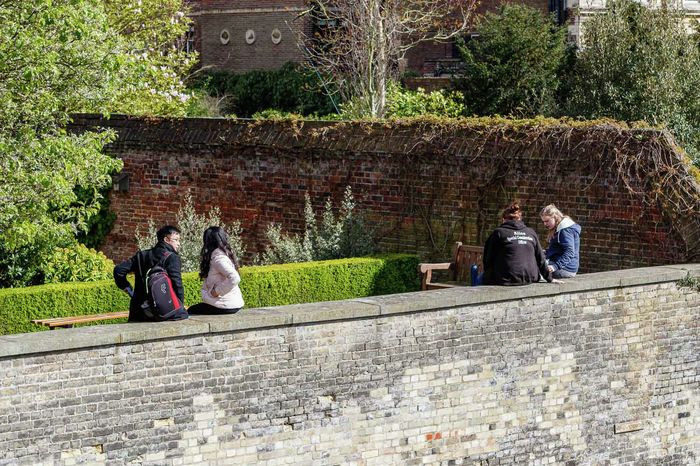We have a fixation with tracking ourselves
Tracking apps cause more harm than good, argues Ellie Buckley

For anything that could possibly warrant tracking, there is an app for it. Step tracking, goal tracking, even apps to track what you’re reading, watching, or listening to all at once. More recently, with the rise of gadgets like Oura rings (although deeply out of the student budget), there has been an increasing move towards health tracking, particularly sleep and stress. In a recent YouGov poll, it found that 37% of Britons own and use a wearable device to track various aspects of their life. The idea is that by tracking yourself, you can understand yourself better, and therefore improve your lifestyle. But it seems that by this excessive tracking in both the health- and hobby-sphere of our lives, our sense of self becomes reduced.
This is not coming from a place of superiority. I, too, have previously kept a close eye on my step count and heart rate, as well as attempting to track my monthly reads (it’s true that I did feel better once I got to move another book from ‘to be read’ on Goodreads to ‘read’). Although these apps are made to jolt us into better habits, I found that I became preoccupied by meeting the targets I set for myself, as opposed to enjoying the experience of reading a book or going for a walk.
“I found that I became preoccupied by meeting the targets I set for myself”
Things I once enjoyed, like watching films and reading for pleasure, quickly became chore-like, feeling like I must track to keep up my consistency. I can admit that these apps, especially the ones that track hobbies as opposed to tracking health, allow a chance to process and express opinions on a text or film, and to share that with others, but isn’t a journal, notebook, or even conversation enough? Why must we be concerned about how we convey our opinions on a piece of media, trying to make it sound flowery, because we know other people may see and read it? All of these factors detract from objectively fun activities, through feeling obliged to document it and share fully formed opinions after one watch or read.
Having access to what other people were watching or reading, or even seeing how far somebody else had run that day whilst I had done nothing made me feel extremely competitive and envious. Why wasn’t I running miles everyday, or flipping my way through a book in a day? I felt wholly insecure in the fact that it seemed I was doing very little, while everybody else seemed to be living five lives within one, and documenting it for all to see. I became disconnected from my hobbies, feeling like my achievements were nothing compared to other people. How could I log that I ran 3km when others are doing three times that? Although this can sometimes provide motivation to do more, more often than not it simply leaves you feeling unaccomplished.
This movement, labelled as the ‘quantified self,’ promotes a focus on the numbers as opposed to the experience and the journey of partaking in an activity, hobby, or a health-related pursuit. As long as there is something to share with the followers you have on the tracking apps, then it doesn’t matter how you get there. Running influencers have even used Strava mules to make it appear as though they are running far and fast, adding to this competitive desire to look like you’re doing more than anybody else, which in turn can lead to others doubting their own abilities.
Tracking makes us focus on the daily number as opposed to the end goal of the health and emotional benefits it can give you. It stops being a way to figure out exactly what we want from tracking, perhaps to see the gradual improvements over time, and transforms into questioning our abilities and therefore being less proud of what we achieve.
“As long as there is something to share with the followers you have on the tracking apps, then it doesn’t matter how you get there”
Tracking our health and hobbies so emphatically can only serve to negatively impact us, whether through feeling poor in comparison to others, or by disrupting the process of enjoyment. Our hobbies and exercise goals should be centred around the individual. The focus should be on trying to figure out what we want to achieve and learn, or what we personally want to watch or read, as opposed to seeing what others are doing and feeling obliged to do the same.
These apps can be beneficial, a mini time capsule into one’s progress in, say, running or film critiquing. But, they only work if time is spent collating and curating, as opposed to rushing with no thought other than to keep up with others. There should be more emphasis placed on enjoying things for what they are, rather than what they could be when inputted on an app.
Want to share your thoughts on this article? Send us a letter to letters@varsity.co.uk or by using this form.
 News / Cambridge student numbers fall amid nationwide decline14 April 2025
News / Cambridge student numbers fall amid nationwide decline14 April 2025 Lifestyle / First year, take two: returning after intermission14 April 2025
Lifestyle / First year, take two: returning after intermission14 April 2025 News / First candidate to announce chancellorship bid pledges to tackle bullying 12 April 2025
News / First candidate to announce chancellorship bid pledges to tackle bullying 12 April 2025 News / Uni to ‘review’ tripos rankings and weekend lectures in undergrad teaching overhaul10 April 2025
News / Uni to ‘review’ tripos rankings and weekend lectures in undergrad teaching overhaul10 April 2025 News / PETA urges Cambridge dictionary to change ‘derogatory’ rat definition11 April 2025
News / PETA urges Cambridge dictionary to change ‘derogatory’ rat definition11 April 2025





